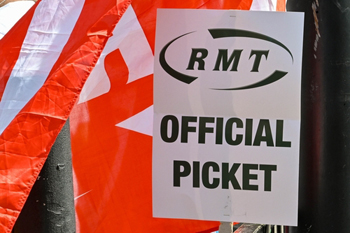The passenger watchdog has slammed rail firms for their inability to offer a reliable service on days when no strikes are taking place.
It follows advice from train operating companies (TOCs) ahead of the current phase of strikes by RMT union members that passengers should only travel if absolutely necessary on both strike days and non-strike days, with one firm having issued what it called ‘an effective five-day travel ban for rail users’.

Image: RMT
Thursday (15 December) saw many rail services cancelled and delayed for a variety of reasons, with TOCs claiming a knock-on effect of strikes on Tuesday and Wednesday.
Anthony Smith, chief executive of the independent watchdog Transport Focus, said: ‘As thousands of people plan to travel to visit family and friends, it is disappointing that the railway can’t offer a reliable option. With weeks of disruption likely, and some areas left without any trains at all, this will also impact those trying to get to work, education and other essential activities.
‘Operators must get clear, reliable information to passengers on what trains will run, as soon as possible. Anyone who has already bought tickets must be told and offered alternatives or their money back. We will work with industry to ensure it learns the lessons of previous strikes, including better information on the ground.’
The RMT said on Wednesday that its members’ action had ‘effectively shut down the railway across the country’ but that it would meet the rail minister and industry chiefs on Thursday in a bid to come to a negotiated settlement on job security, pay and working conditions with Network Rail and TOCs.
General secretary Mick Lynch said: ‘I congratulate RMT members who have shown enormous dignity and rock-solid fortitude throughout this 48-hour strike.
‘They have shown how important their work is to the functioning of the economy and wider society.’
Separately, drivers’ union ASLEF disputed a claim by transport secretary Mark Harper that TransPennine Express had made a ‘generous revised offer’ to its members in relation to moving away from rest day working towards a seven-day working week.
A spokesperson told Transport Network that the offer had been significantly less than drivers currently earn through working rest days.
ASLEF also said that Northern had yet to make an offer on rest day working, despite Mr Harper’s assertion that he had ‘given TransPennine Express and Northern the scope they need to put a meaningful and generous rest day working offer to ASLEF’.
Register now for full access
Register just once to get unrestricted, real-time coverage of the issues and challenges facing UK transport and highways engineers.
Full website content includes the latest news, exclusive commentary from leading industry figures and detailed topical analysis of the highways, transportation, environment and place-shaping sectors.
Use the link below to register your details for full, free access.
Already a registered? Login